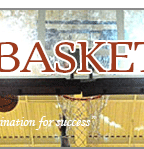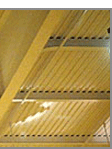 |
 |
 |
 |
 |
 |
 |
Regulations
Players May Not Play in Seven Quarters
Players are permitted to play in six (6) quarters in a day. (See Rule 33 for tournament exception) Coaches should check the official scorebook prior to the start of the game and make sure that the official book has the correct number of quarters played in the proceeding game so as not to have 6th quarter violations. The home scorebook is the official book. The home scorebook from the previous game that day should be available for the scorekeeper to verify the number of quarters played the first game of the evening and record the number quarters a player has left to play in the official book. Officials may not allow a player to enter for a seventh (7th) quarter. A technical foul is not assessed, the player may not enter the game. If a player is already in the game when the 6th quarter violation is discovered, they are to be taken out of the game immediately. The school administration should report violations to the KSHSAA following the contest. Players are permitted to play in a maximum of two games in one day in the same tournament bracket.
Tournaments
Schools having JV and Varsity teams (or 2 other levels) in tournaments the same week may not allow players to play six (6) quarters in one day in two different tournament brackets. The six (6) quarter rule is applied only during regular season game nights – not tournaments. A player may play in two games in one day in the SAME tournament only. This has traditionally been done in sub-level tournaments.
Games not played
Games not played because of weather challenges do not count as a win or loss for either team it is simply no game played. This applies to both regular season and tournament games. See Basketball Manual for further information.
Team Introductions
During team introductions only authorized cheerleaders, team members and bench personnel are allowed on the court. Spectators must stay outside of the court and may only be lined up on the half of the court their team is being introduced on. Once team members are introduced they are not to go to center court for their pre-game rituals these should take place at the free throw line circle.
Coaching Box
Head coaches may stand and coach during the game provided they stay in the 28 foot coaching box. Coaches may not squat or kneel along the sideline. In order for a coach to use the coaching box they must begin the game by sitting where the box is located. A coach is not required to use the coaching box, but if the coach begins the game by sitting somewhere other than where the box is located, he/she may not use the box privileges any time during the game. The coaching box should be marked properly before a game begins, even if that means with athletic tape.
Proper use of the coaching box is expected. Coaches leaving the 28 foot box or being on the playing court during a live ball will be penalized. Wandering coaches create problems including:
- Distinct advantage gained by ability to better communicate with teams
- Interferes with play
- Distracting to players and officials
- Perceived as an intimidation tactic toward officials and table personnel
- Can incite inappropriate player, bench and spectator behavior
- Coaches must remain in the box while coaching. Officials should warn the coach on the first offense of being out of the box “just coaching”. The second offense a technical foul should be assessed to the coach.
Assistant Coaches
Assistant coaches do not have the same coaching box privileges as the head coach. Only the head coach is permitted to address officials. Assistant coaches must be seated at ALL times, except during time outs or intermissions, to attend to an injured player after being beckoned, to spontaneously react to a play and then sit down.
Sporting Behavior
Players are to wear their uniforms as intended and jerseys are to be tucked in and shorts worn above the hips. Players not wearing uniforms properly should not be allowed into the game and will be directed to leave the game by the officials. Players may not remove their jersey in the visual confines of the playing area, the penalty is a technical foul. Game administrators are to provide a safe environment for players, coaches and officials and should be proactive in dealing with inappropriate fan behavior. Head coaches are to remain in the coaching box. Misusing the coaching box will result in a technical foul. Assistant coaches must be seated at all times except during time-outs, intermission, attend to an injured player when beckoned or to spontaneously react to a play.
Running Clock Option
NFHS Rule 5-5-3 allows states to adopt a point differential (running clock) plan. The KSHSAA Executive Board approved the use of the following guidelines: By League Adoption or by agreement of school principals in advance of the contest, a running clock may be used in the third and/or fourth quarter when a 30-point differential is reached. The Running Clock Option Rule will apply to all levels of play grades 7-12. The 30-point running clock will be used in KSHSAA postseason sub-state tournaments beginning in the fourth quarter. Beginning with the start of the third quarter, any time the score differential reaches a 30-point margin, the clock shall continue to run except when stopped per NFHS playing rules, e.g., called time-out, an injured or bleeding player. The option exists in the regular season to implement this in only the fourth quarter, and not the third.
No Dunking During Warm-up Periods
Players may not dunk the ball at any time during warm-ups, regardless of whether or not the officials are present. It is the responsibility of coaches and game administration to ensure this does not occur. This includes halftime warm-ups of the preceding game. Players shall not grasp the baskets at any time during the game except to prevent injury; dunk or stuff, or attempt to dunk or stuff a dead ball. (NFHS BB Rule 10-3-3)
KSHSAA Executive Board policy states: Officials observing dunking during a warm-up period (including halftime of the proceeding game) should report the team violating and the number of the player violating to the score table. This may be the officials waiting for the next game, or the officials from the game in progress. The officials who have jurisdiction over the game will administer a bench technical to the violating team prior to the game starting. The bench technical is an indirect technical to the head coach. It results in the loss of coaching box privilege. (10-1-5a) If a backboard is broken due to dunking or grasping a ring during warm-up, the responsible school shall be liable for the cost of replacing the board
Revised 8-9-2017